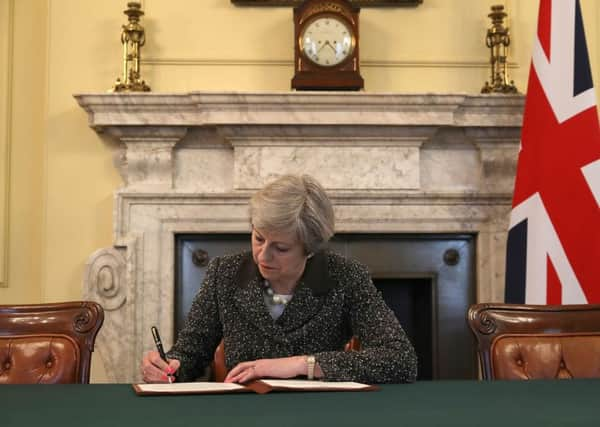ARTICLE 50: Negotiations on trade key to farm fates


The warning came from one industry group as the farming world struck a largely vigilant tone, but also one of optimism, as Theresa May triggered Article 50 this week to mark the beginning of the nation’s negotiations on the terms of its formally withdrawal from the European Union.
From the National Farmers’ Union (NFU) came the publication of the first of a series of reports to set out its vision for the future of the industry, in which it proposes three cornerstones for new British agricultural policy: productivity, resilience and the environment.
Advertisement
Hide AdAdvertisement
Hide AdAfter Mrs May was photographed signing Britain’s Article 50 letter on Wednesday, Environment Secretary Andrea Leadsom took to Twitter to state her own confidence for Britain’s future, tweeting: “An amazing moment - I’m so very proud of our decision to leave, and so optimistic about our future in the world.”
However, such optimism will only persist if British agriculture secures positive trade agreements, according to the Agricultural Industries Confederation.
The European market currently accounts for about 75 per cent of the UK’s food exports.
Paul Rooke, head of policy at the confederation, said: “Without clarity on future trade, UK agriculture could become one of the most significantly affected areas of the British economy. It could put at risk all the systems that have been developed over the past decade or more to deliver the assurance, traceability and high standards that the UK public has demanded.”
Advertisement
Hide AdAdvertisement
Hide AdDorothy Fairburn, regional director of the Country Land and Business Association, argued likewise, saying: “Negotiating the best possible free trade deal for UK food and farming sector with the EU will be essential for the North, especially since farming activity here intersects with a healthy visitor economy. Outside the EU, new markets and opportunities also beckon and it will be important that our agri-food sector competes and trades on a level playing field.”
Meurig Raymond, the NFU’s president, met Mrs Leadsom last week and said that she “shared our ambition to maintain free and open trade with the EU once we leave”.
The Pembrokeshire-based farmer said he believes Britain’s trading relationships will determine the course of the nation’s new agricultural policy.
“If the Government secures a free trading arrangement with the EU, ensures UK farmers are not disadvantaged by future trade deals outside the EU, and ensures the industry’s labour needs are met, then we can consider an ambitious new policy - one that is designed specifically for our domestic farming sector, involving a wide range of measures which focus on productive, resilient, sustainable and profitable farm businesses.
Advertisement
Hide AdAdvertisement
Hide Ad“If we get a bad deal for farming, then measures to manage volatility - such as direct payments - will remain vital to help farm businesses compete in an uncertain world.”
Tenant Farmers Association chief executive, George Dunn, said he believes “it matters much” to the UK farming sector that it continues to have free access to the European single market, at least on a transitional basis, as Britain seeks to develop trading relationships with other parts of the globe.
The tenanted sector leader also warned that despite a greater understanding of how much Britain relies on EU migrant labour on farms and in food processing plants, “some of this labour is returning to their home countries and the void is not being made up by British nationals”.